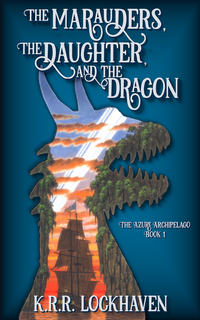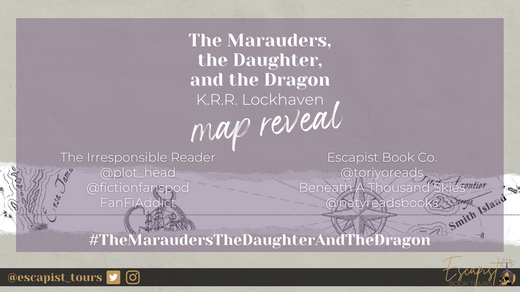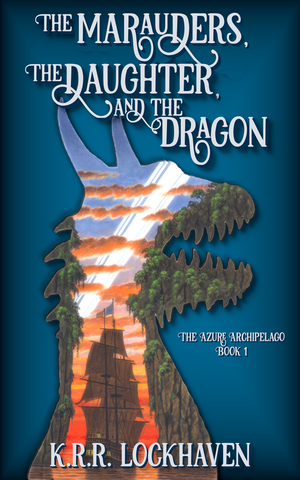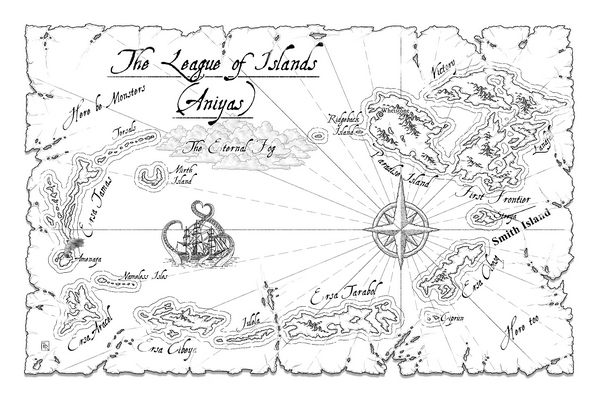 The Marauders, the Daughter, and the Dragon
The Marauders, the Daughter, and the Dragon
DETAILS: Series: The Azure Archipelago, #1 Publisher: Shadow Spark Publishing Publication Date: August 16, 2022 Format: eARC Length: 331 pg. Read Date: August 1-3, 2022

A Couple of Preliminary Matters
I was supposed to post something about this a couple of weeks ago in return for my advanced copy—August 23 was my plan—but I just didn’t like anything I wrote there (and have ended up deleting almost all of it, almost everything here is new today). It was one of those perfect-is-the-enemy-of-done situations. I want to apologize to Lockhaven for that, and stress that you should all do what I did: go buy a copy of this book and enjoy a bit of happiness. Also, go check out the Q&A we did about this book.
I’m still not crazy about this post, but it’s done. So it’s got that going for it. Here it is in a nutshell: this novel is appealing, sweet, and earnestly fun. You should read it.
What’s The Marauders, the Daughter, and the Dragon About?
The League of Islands has a new governor. He came to power by tapping into, and exacerbating, human prejudices against other species—orcs, ciguapas, fauns, and so on. One of those humans, is the co-owner of the Red Dragon Inn, John Brine. John’s daughter, Azure (yes, she’s “The Daughter”) is not a fan of the new governor or his “Human First” policies. Years ago, the two were incredibly close, but things have been increasingly strained for some time, her father deciding to close the Inn to accompany the governor on the ship he’s taking to his inauguration, was the last straw. The two have a major blow-up before he leaves.
Azure regrets things almost immediately and tries to catch him before he leaves. It doesn’t work, so she and her friend/companion/might-as-well-be-sister, Robin (a talking bird summoned from another dimension), finagle their way on board. Azure has to swallow her objections and pretend to be a supporter, so she can stay on board and try to patch things up. While there, Azure becomes convinced that there’s an ulterior motive for this voyage and tries to suss it out. Whatever it is, it’s going to be big and bad for a good portion of the populace of the League.
That doesn’t work and Azure and two non-humans on board are cast off and end up on an island. They encounter a group of quasi-pirates (the “Mauraders) who bring them on board and end up agreeing to help Azure put a stop to whatever the governor is up to.
And, yes, there’s a dragon along the way. But I don’t want to tell you anything about him.
The Daughter
It’s Azure’s status as “the Daughter” that provides the heart for the novel—without it, there wouldn’t be a story. She wouldn’t be the protagonist of anything—she’d have stayed home, working in the Inn. She’d likely have griped about the political situation, but wouldn’t have done anything beyond that.
But she loves her father, and can’t stand to see him taken in by this Governor. So she abandons the inn, pushes down her anxieties, and sallies forth to save her father and hopefully, their relationship.
There are other storylines, other emotional arcs—some you may appreciate more than this one. But none of them happens without this—and the novel doesn’t care about the rest as much as it does this one. It’s also incredibly relatable—sure, not every daughter (or son) who reads this will have that kind of relationship with their father (or mother), but there are very few of us who don’t have some sort of relationship they’ll risk everything for.
The Marauders
I do not know how someone couldn’t like this group. It’s a group of men and women who, for various and sundry reasons, have embraced life on the seas, of swashbuckling their days away (at least until they have to embrace responsibility or parenthood)—they’re not ambitious enough to make a serious effort at transporting passengers or cargo. They like the idea of a life of piracy but aren’t that into all the violence or theft and all that. They like to sail, have adventures, and sit around drinking, telling stories, and singing songs all night. If not for the fact I get seasick just thinking about getting on a boat, it sounds like a great life to me. Oh, and that no one should have to hear me sing.
The camaraderie of this group and the way they embrace Azure and the others is more attractive than their way of life. You can’t help but want a group of people like this to spend your days with.
I should mention their songs. I have little patience for songs/poetry/etc. in the middle of a novel. My brain just turns off when I encounter them, despite years of trying to do otherwise—it doesn’t matter how good they might be, I just can’t do them. But these songs? I actually read most of them on my first attempt. And I enjoyed them.
The Dragon
Yeah, this is too risky to talk about without spoilers. There’s a dragon, it flies around doing dragon-y things.
Comparing Lockhaven’s Works
Comparing this novel to Lockhaven’s previous novel is a classic case of comparing apples to oranges (making Zoth-Avarex’s Escape Plan a Clementine, I guess). The Conjuring of Zoth-Avarex was a comedy with a bit of satire. MD&D, is a humorous fantasy or maybe a light fantasy (last year, Lockhaven described it as “hopepunk” in our Q&A). The former went for as many laughs as it could while telling a story. This tells a story, and throws in a few laughs (or grins or chuckles) along the way. The comedy isn’t the focus, it’s the characters and their journey.
So, what did I think about The Marauders, the Daughter, and the Dragon?
I want to talk more about some of these characters and ideas—Elijah, the talking skeleton; Nargol and Orok, the orc couple; I don’t believe I’ve even heard of ciguapas before, and now I want them everywhere; Roger, the happy and nice crew member on the Governor’s ship—but in the interest of space, and of just getting something completed, I’m going to pass over it. But I assure you that this collection of characters is just fantastic and you’ll want to spend a lot of time with them.
There is a sweetness to this book that you just don’t find very often—particularly in Fantasy. There is that hope implied in the way Lockhaven described it, and an earnestness, a straightforwardness to almost every character and their motivation that fuels this hope and sweetness. It’s worth reading the novel just for this.
That’s also part of the problem—just about everything is too straightforward, there’s almost no nuance, no shades of anything, no complexity. I’m not saying the book or the characters needed to be complicated, obtuse, murky, or compromised, etc. But it leads to the book feeling shallow on occasion.
The magic system is intriguing—and I’m curious to see how it is expressed outside of the circumstances of this book. I don’t often encounter a multiverse in a fantasy novel, and that alone would almost be enough to bring me back.
While reading, I got caught up in the spirit of the book—that doesn’t happen that often—that hope and earnestness seeped into my subconsciousness and affected how I saw the world for a couple of days. I like this book—I heartily recommend it, and the overall impact more than makes up for any shortcomings (real or perceived). I’m eager to see what lies ahead for Azure and the rest.
Disclaimer: I received this eARC from the author in exchange for this post and my honest opinion.

![]()








